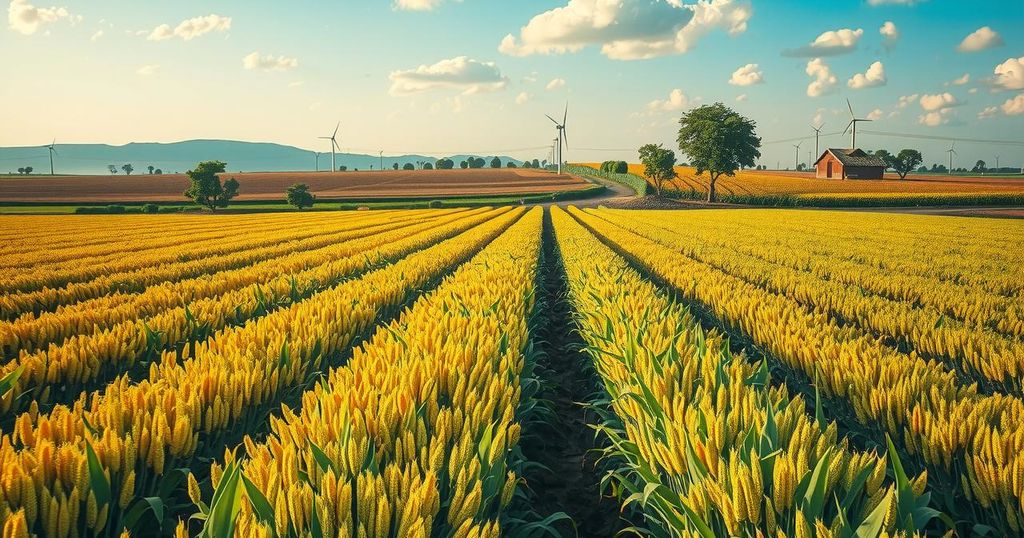Southeast Asia needs both mitigation and adaptation strategies to secure food. The Paris Agreement set ambitious emission targets; however, the emphasis on adaptation is crucial due to exacerbated climate conditions affecting agriculture. ASEAN Member States should pursue climate-smart agriculture, diversify crops, and enhance awareness of minimizing fossil fuel consumption. The upcoming ASEAN Summits and COP30 are vital for promoting food security and adaptation measures.
In Southeast Asia, ensuring food security necessitates both mitigation and adaptation strategies. While the Paris Agreement of 2015 set ambitious emission reduction targets, the focus on mitigation has dominated ASEAN Member States’ Nationally Determined Contributions (NDCs). An emphasis on adaptation is crucial given the inadequate results of global mitigation efforts, highlighted by record temperatures exceeding 1.5°C above pre-industrial levels, raising doubts about achieving established climate goals.
Although ASEAN Member States contribute minimally to global greenhouse gas emissions, they face significant impacts from climate change, such as extreme weather conditions that adversely affect agriculture. These adverse climatic events have led to decreased crop yields, particularly in staple crops like rice and oil palm while increasing labor challenges and harming marine ecosystems. Addressing climate change’s effects on food security requires an urgent shift toward adaptation measures, which must be implemented alongside mitigation strategies.
The relationship between climate resilience and food security is intricate. While diversifying crops, such as adopting drought-resistant varieties, is a recommended action, it falls short of sustaining traditional staples like rice. Countries like the Philippines may continue to depend on rice imports, contradicting resilience goals. Additionally, changing consumer preferences complicate the transition towards alternative diets. Hence, developing comprehensive policies that address food import diversification, along with adequate supply chain strategies, is crucial.
Another suggested strategy is the adoption of climate-smart agriculture. However, many ASEAN Member States struggle with the large-scale deployment of climate-resilient crop varieties due to seed availability and inconsistent yields. Collective efforts among member states are vital for designing and disseminating these innovations effectively. Expanding agricultural lands for self-sufficiency raises concerns regarding the conservation of critical carbon sequestration sites such as forests and peatlands, suggesting a more focused effort on enhancing existing agricultural efficiency is warranted.
Several ASEAN countries advocate renewable energy in their climate policies, enhancing resilience across various sectors. However, the application of these policies specifically for smallholder farmers, who produce a significant proportion of the region’s food supply, remains limited. Thus, efforts should concentrate on improving the efficiency of carbon-based fuels currently utilized in agriculture.
Implementing adaptation measures necessitates time and should occur concurrently with mitigation efforts, not merely as an aftermath response. The upcoming ASEAN Summits present opportunities for these nations to exhibit leadership in food security initiatives by crafting and showcasing plans for agricultural climate adaptation. The anticipated Strategic Plan for Food, Agriculture, and Forestry (2026-2030) represents a potential milestone for demonstrating commitment. Furthermore, the forthcoming COP30 in Brazil offers ASEAN a platform to advocate for enhanced financing and actionable strategies focused on climate adaptation while reaffirming mitigation goals.
In conclusion, as Southeast Asia confronts significant challenges pertaining to food security amid climate change, the need for a balanced focus on both adaptation and mitigation strategies is evident. While mitigation efforts are necessary, they are insufficient on their own without adequate adaptive measures. Sustainable agricultural practices, diversification of crops, and improvements in existing agricultural efficiencies must be prioritized to build a resilient future for the region’s food supply. The upcoming ASEAN Summits and COP30 serve as crucial platforms for promoting these initiatives.
Original Source: fulcrum.sg






